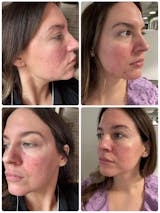
Final exams, wedding planning, a deadline looming – stress happens to everyone.
As if dealing with the uncomfortable feelings of stress isn’t enough, many of us also find that our acne gets worse during such times.
Is this just a myth or is there more to it?
What Does the Science Say?
While stress is not a direct cause of acne, research over the years has found a relationship between stress and acne flare-ups1. So yes, it’s not just in our heads.
Stress may not trigger breakouts for those who are not prone to it, but if you already have acne, stress may make it worse. You might have also noticed that the more stressed you are, the more pimples pop up.
A Stanford University study from 2003 found that its sample of students had more stress during exam time (understandably) as well as more severe acne2. Beyond that, they discovered increased acne severity was significantly associated with increased stress levels. This suggests that emotional stress from external sources may have a significant influence on acne.
Why is this the case? There are several reasons:
Increase in Oil Production
As you might already know (because we talk about it so often), at the root of all acne is a clogged pore. What causes pores to clog up is a build-up of dead skin cells, dirt, and excess oil.
When we’re stressed, our bodies release more of the hormone cortisol. This causes our sebaceous glands to ramp up production of oil, leading to more clogged pores and acne3.
A study of cultured (aka artificially grown) cells also found that cortisol, at a higher level, decreased the synthesis of hyaluronic acid (HA) by 50%4. Because HA is our skin’s natural moisturizer, this finding supports the link between increased cortisol levels and oil production. That is, having less HA can dehydrate skin, leading to more oil being produced as compensation.
If you find your skin is oily but dehydrated, you’ll love having the Matte Hydrator in your routine. Formulated with medical-grade ultra-low-molecular-weight hyaluronic acid, it will easily absorb into skin and leave a clean, matte finish.
Slower Healing
One study investigated the effects of psychological stress on wound healing. Researchers studied 13 women caring for a relative with Alzheimer's disease (a likely source of stress) and 13 controls. All the women underwent a 3·5 mm punch biopsy wound. What the study found was that wound healing took significantly longer for the caregivers than the controls, suggesting stress could negatively affect wound repair5.
This means that when stressed, wounds, including acne, can take longer to heal. And when pimples stay longer on the skin, they can be more susceptible to increasing in severity.
Poorer Lifestyle Choices
Apart from what goes on inside our bodies when we’re stressed ,the negative emotions we experience can also lead us to poorer habits and choices. We could be eating more sugary foods, sleeping less, or deprioritizing our skincare routines. These can all lead acne to worsen.
How Can I Reduce Stress?
Whether you’re facing short-term stress from a big event you have right now, or more chronic stress from the many responsibilities in your life, it is crucial to find ways to manage it. If not for the sake of your skin, for your overall health.
What is relaxing to others may not be to you so give yourself time to find what works. Many people have benefited from yoga, meditation, exercise, extra sleep, and aromatherapy so consider making room for these in your schedule. You could also try knitting, painting, talking to a friend, or anything that makes you happy and helps you unwind.
While reducing stress can help give you clearer and healthier skin, it is important to note it should not be considered an acne treatment. You still need proper skin care to not only clear current acne, but prevent them from forming in the future.
A bonus is that your skincare routine can be a wonderful practice in mindfulness, which can help you slow down and relax!
Feeling stressed about skincare and all the options out there?
Clearly Basics is a skincare line made for acne-prone and sensitive skin. This means all our formulations are gentle enough to care for vulnerable skin yet effective enough to clear clogged pores and prevent future breakouts. Shop the line here.
If you have more questions, we’re here to help! Get in touch with us via Messenger chat or Instagram DM (@clearlybasics).
References
- American Academy of Dermatology: Adult acne
- Annie Chiu, BS et al., 2003: The Response of Skin Disease to Stress
- Herbert P. Goodheart, MD, 2006: Acne for Dummies
- H Larjava et al., 1980: Cortisol decreases the synthesis of hyaluronic acid by human aortic smooth muscle cells in culture
- Prof J.K. Kiecolt-Glaser, PhD et al., 1995: Slowing of wound healing by psychological stress
Disclaimer: This article should not be interpreted as personal medical advice. For medical-related matters, please consult your dermatologist.







